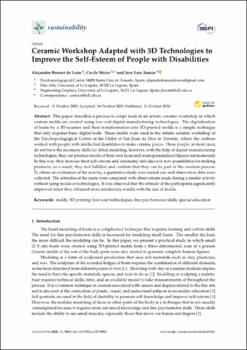Ceramic Workshop Adapted with 3D Technologies to Improve the Self-Esteem of People with Disabilities.
Date
2020Abstract
This paper describes a process to adapt tools in an artistic ceramic workshop in which custom molds are created using low-cost digital manufacturing technologies. The digitalization of busts by a 3D scanner and their transformation into 3D printed molds is a simple technique that only requires basic digital tools. These molds were used in the artistic ceramic workshop of the Psychopedagogical Center of the Order of San Juan de Dios in Tenerife, where the authors worked with people with intellectual disabilities to make ceramic pieces. These people, in most cases, do not have the necessary skills for detail modeling; however, with the help of digital manufacturing technologies, they can producemoldsoftheirownfacesandcreatepersonalizedfiguresautonomously. In this way, they increase their self-esteem and autonomy and discover new possibilities for making products; as a result, they feel fulfilled and confirm that they can be part of the creation process. To obtain an evaluation of the activity, a qualitative study was carried out, and observation data were collected. The attitudes of the users were compared with observations made during a similar activity without using molds or technologies. It was observed that the attitude of the participants significantly improved when they obtained more satisfactory results with the use of molds.






